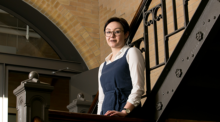Natalie Boychuk is a Munk One alumna and third-year Peace, Conflict, and Justice student at the Munk School of Global Affairs. She shares with us her thoughts on long-term development aid, women’s issues and the importance of assisting refugees.
What brought you to the Peace, Conflict and Justice (PCJ) program?
I learned about it through my experience with the Munk One program. I really like that PCJ doesn’t take a traditional view of international relations. It’s about bringing in voices from communities that aren’t often heard and talking about issues that are under the radar. I think that focus is something that is really unique about the Munk School in general.
What’s a global issue you’re passionate about and why?
I’m really passionate about the intersection between humanitarian assistance and long-term development aid.
As conflict becomes more prolonged, complex, and frequent, there’s a need to adopt new and innovative approaches to assisting those who have been affected by humanitarian crisis. There is a gap between what is humanitarian assistance and what is development aid because right now they are two parallel systems and institutionally very different. But I think we can close that gap and improve how we help communities who go through trauma. If you have a family who has lived in East Ghouta, where there’s a lot of armed conflict between rebel groups, and that family has just managed to escape that conflict zone, how do you help their kids to be empowered and educated for the next ten years? How do you make sure they don’t get left behind? Those are the kind of questions I really want to help answer.
If you could interview anyone from your life, who would it be and why?
If I could interview anyone, it would be my Baba. That’s ‘grandma’ in Ukrainian. Both my grandma and grandpa were refugees after the Second World War. Since my grandpa passed away, I’ve been trying to ask my Baba more questions about her life, and I have learned some pretty shocking things. For example, I learned that she was kidnapped from her home by German soldiers and forced to work in a factory. She ended up in a displaced person camp in Germany and after the camp was liberated by the Allies, she and my grandpa tried to make it to Canada, the UK, or Australia.
Hearing about my grandpa arriving in Canada with nothing and creating a life for his family, makes me feel optimistic that Canada can continue to improve its assistance for refugees moving forward.
What impact do you want to make in the world or your local community?
If I can do anything by the end of my career, I would hope that women and girls who have been affected by conflict have access to education and healthcare and that they aren’t left behind. Education and reproductive health for women and girls are issues close to my heart.
I was recently involved in a women-focused research project in India. We went to Bangalore to research a union started by female garment workers. Sexual harassment in garment factories is a huge problem in Bangalore – one in seven women experiences sexual harassment at work. In order to combat this, a group of garment workers formed a union. For a small fee, garment workers have access to childcare, where their kids can learn three languages, eat three meals per day and learn how to read. The union offers psychosocial support for women who have been sexually assaulted and legal counselling for victims of domestic violence. The focus is on empowering women while they are inside the factory, but also while they are outside in their community.
What is your personal philosophy?
I’m just at the beginning of my career, but it made a huge difference for me when I stopped thinking about what title I want on the door of my office and started thinking about the problems I want to solve. It’s so important to focus on the kind of problems you want to work on because that’s what is going to get you out of bed every morning. And secondly, be nice to other people.
February 26, 2018
